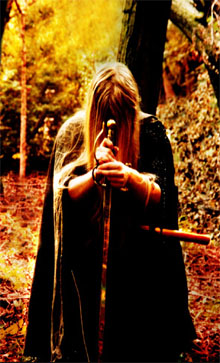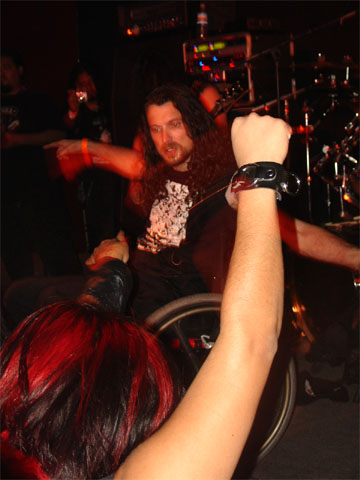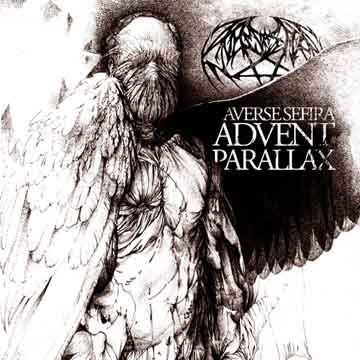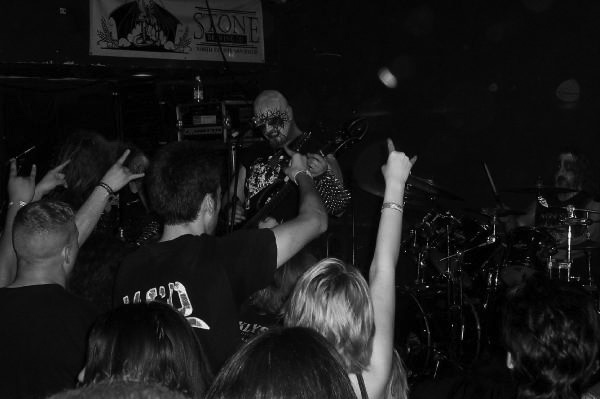 When black metal went more toward an orthodoxy that by nature of emphasizing its strengths, simplified its technique to the point of crumbling complexity, Summoning went another direction, and made slower, reverent music about a former (and possibly future) time of honor and conflict. In the history of metal, Summoning represents one of the more potent variants of ambient metal and an encouraging aesthetic for anyone tired of modern time. Protector, one half of the dynamic duo that Summoning became, went on to participate in several other projects focusing on a classic theme of black metal: an ambient consciousness from which a sense of beauty and thus meaning in life emerges.
When black metal went more toward an orthodoxy that by nature of emphasizing its strengths, simplified its technique to the point of crumbling complexity, Summoning went another direction, and made slower, reverent music about a former (and possibly future) time of honor and conflict. In the history of metal, Summoning represents one of the more potent variants of ambient metal and an encouraging aesthetic for anyone tired of modern time. Protector, one half of the dynamic duo that Summoning became, went on to participate in several other projects focusing on a classic theme of black metal: an ambient consciousness from which a sense of beauty and thus meaning in life emerges.
You have created music in several bands, and have been moving toward ambient material throughout this career. What inspires you to work with this medium instead of more concrete one?
My music can be surely described as ambient music, but for me that term is not an opposite to the word “concrete.” I always take care to make concrete melodies and rhythms which you could even create well with more traditional instrument or transcribe into notes. Un-concrete music is for me rather music based only on soundscapes and noises which don’t transport melodic or rhythmic information like many real ambient bands do. I always tried to be melody- and rhythm-oriented and always use sounds as carrier of that; I rarely use a sound just for the sake of the sound.
What definitively makes music ambient is the slower tempo and the multi-layered structure. Instead of playing a lot of super fast short riffs in fast succession, I prefer to create longer harmonic structures and build up a song by repeating them and adding more and more layers to it. That might sound monotonous for people used to fast breaks and tempo changes but that’s for me the way music has the most intense effect. Hearing different musical information at the same time is for me far more interesting than hearing bits of information in succession because that way I have more the feeling of a long huge song and not the feeling as if I were listening to 10 short simple songs that are combined into one long song.
When you write songs, do you start with a visual concept, or a riff, or something else?
The music is always the most important thing during the composing process. I neither think about anything visual nor about lyrics until the very end of a song creating process. With Ice Ages, I start from deep sounds while the higher ones appear the more the song grows. In Ice Ages I often have some kind of bass drum sound or a mighty bass line and with the keys I play around without any special musical aim. I think the less fixed the mind is during the early songwriting the better results I get. This does not mean that I never work in a structured way; on the contrary, structured work is one of the most important things for me, but structure without some kind of chaos (or creativity in another word) is not possible. After I have a nice bass drum or bass line part I see if I like it and if I like it the competition of that song fragment is already clear. I easily find new sounds and new layers which I add after each loop and in most cases after 1-2 hours I already have a full musical arrangement in full length.
Summoning seems to rest at an intersection of genres. What were your influences, and how did they urge you to reach for this unusual style?

I never considered my way of working as a mix of different musical styles. Actually, the crossover idea that was birthed already 22 years ago with bands like Faith No More is for me rather something old fashioned than anything progressive. So I never tried to take any existing musical styles and mix them together to pretend to create something new; I just make the music I have inside and see what comes out. When I was a child I learned classical drums, including kettle drums and march drums before I started to learn rock drums. My rhythmic style surely came from this part of my life. Also, the idea to create orchestral sounds is rather close at hand if you play the first time with a keyboard and check the different sounds. Another important part is the mentioned love for slower tempos which naturally grew at the time when super fast death metal was popular. It was a time where fast tempi started to bore me. So all in all you can see that the style is not the result of a wish to confuse people with style mixes but rather an expression of my musical taste and the musical experiences I have had during my life.
When Hellhammer said, “Only Death is Real,” it launched legions of death metal and grindcore bands who showed us through sickness, misery and sudden doom (in their lyrics) that life is short, manipulations are false, and we need to get back to reality. Where should the genre go from there?
I cannot see much reality in metal of today. Apart from some hardcore bands for me most of the metal (specially black metal) music is more a kind of fantasy music even if they don’t have fantasy lyrics. Even if some black metal bands try to spread some political views it’s also just a kind of fantasy as it mainly deals with some 1000 year old tribes that don’t have much in common with the present world. And also singing about death is not really dealing with reality because no one can know he feels after death.
But it should be particularly noted that if a public that was first placed in this yoke by the guardians is suitably aroused by some of those who are altogether incapable of enlightenment, it may force the guardians themselves to remain under the yoke–so pernicious is it to instill prejudices, for they finally take revenge upon their originators, or on their descendants. Thus a public can only attain enlightenment slowly. Perhaps a revolution can overthrow autocratic despotism and profiteering or power-grabbing oppression, but it can never truly reform a manner of thinking; instead, new prejudices, just like the old ones they replace, will serve as a leash for the great unthinking mass.
– Immanuel Kant, What is Enlightenment?
What are the goals of your art? Is there a goal to art itself?
I don’t think so much in goals, or better said, not in distant goals. The goal is each time to make a perfect album and to add as much music and passion to it as possible. I don’t have any goal concerning “success” for example. I think goals that are too huge are rather disturbing. Specifically, the aforementioned success goal would be a very disturbing one, because it would mean to try to adapt the music to the taste of the masses — which we never did. I think the more a person makes music for the sake of music, the more pure and honest that music becomes. I don’t want the music to become a kind of tool for any other aspects apart from music.
If sound is like paint, and we use different techniques and portray different things in our paintings, what does it say when a genre sounds similar and has similar topic matter and imagery? Can the genre be said to have a philosophy or culture (“subculture”) of its own?
Sure. For example, Ice Ages is always dark and negative, so the spectrum might be limited, but I think that life and the world is something endless so even if you limit the aspect used for your music you still have endless things to sing about. I prefer to focus on special parts than to integrate as many elements as possible. There is not so much super dark slow music around on the world, so it’s a natural thing to deal with that for me.
Ice Ages often sounds like ambient music, soundtracks, and the epic warlike feel of black metal rolled into one style. What sort of “space” are you trying to create for the imagination of your listeners?
In one way the music is different from black metal and in another, it’s similar. As I mentioned, before black metal is also a music far away from reality. Even if they sing about historic battles they still sing about a time long ago which most probably don’t know well and surely never experienced. The farther away a theme is from current reality the more it’s inspiring for fantasy. If you look at people of today they are just people (and in most cases quite boring ones ;-) but if you look on ancient people who were actually the same you can much better let your fantasy grow and imagine what god-like creatures they must have been and put any attitude you like into them.
Ice Ages does not deal with historic themes, but creates moods that make the listener feel as if he would be in a dark future which is far away from present times. And that’s the common thing between black metal and Ice Ages. They both don’t take place in the present world and therefore are both the best way to let your fantasy grow. For me dealing with a dark future world is even more inspiring for fantasy as you are even free from history and can imagine anything you want. When I hear Ice Ages, I often think about a world after humanity, where only the machines remain and rule the world. But that’s of course just my view on it and as music is something totally subjective and any listener will imagine something different in it.
Some have said that death metal and black metal use “narrative” composition, where a series of riffs are motifs that evolve toward a passage between states of mind for the listener. Is this true, and if so, how is it reflected in your songwriting?
If music is considered as narrative then it’s rather a matter of the lyrics than of the music. I know that musicians often want to tell stories just with music, but I think without lyrics that does not work. For example if folk metal bands sing about the nature of their country they surely feel those images in their music but if I would play that music to my mother she what rather say “oh, what evil noise music from hell” and surely not “oh, what a nice landscape I imagine when I close my eyes” :-) music is always totally subjective and depending on your preferences you might imagine totally different things to the same music. The lyrics are the only real concrete thing in a song.
As in all of my projects, the lyrics are always the very last thing we add. We always just think in tunes and harmonies and just think how much they can move our hearts but we don’t really think about stories during the song composition process. Only at the end we add this narrative aspect by adding the lyrics.
Now in what way is the lover to be distinguished from the non-lover? Let us note that in every one of us there are two guiding and ruling principles which lead us whither they will; one is the natural desire of pleasure, the other is an acquired opinion which aspires after the best; and these two are sometimes in harmony and then again at war, and sometimes the one, sometimes the other conquers. When opinion by the help of reason leads us to the best, the conquering principle is called temperance; but when desire, which is devoid of reason, rules in us and drags us to pleasure, that power of misrule is called excess. Now excess has many names, and many members, and many forms, and any of these forms when very marked gives a name, neither honourable nor creditable, to the bearer of the name. The desire of eating, for example, which gets the better of the higher reason and the other desires, is called gluttony, and he who is possessed by it is called a glutton; the tyrannical desire of drink, which inclines the possessor of the desire to drink, has a name which is only too obvious, and there can be as little doubt by what name any other appetite of the same family would be called; — it will be the name of that which happens to be dominant. And now I think that you will perceive the drift of my discourse; but as every spoken word is in a manner plainer than the unspoken, I had better say further that the irrational desire which overcomes the tendency of opinion towards right, and is led away to the enjoyment of beauty, and especially of personal beauty, by the desires which are her own kindred — that supreme desire, I say, which by leading conquers and by the force of passion is reinforced, from this very force, receiving a name, is called love (erromenos eros).
– Plato, Phaedrus
Like in the late 1970s, metal feels to many people like it has lost direction and become hollow. Is a change in direction needed, and if so, will that come from within metal?
I think the problem about metal is that it became a quite conservative scene that lost its rebellious attitude. True, especially in black metal, the bands still try to shock the audience with political incorrectness etc, but concerning just the music the shock effect is lower than ever before. You have now in the metal scene so many neo-bands. Neo-power metal, neo-death metal, even neo-old school black metal but hardly really something new. To be honest, I have not heard anything that surprised me in the last years of metal, while in the past every step from one metal sub genre to the next one was a huge thunder. I remember when I was used to thrash metal and for the first time heard grindcore / death metal; it was really very shocking and took a while to understand that style. Things like that don’t happen any more in the metal scene. For me the metal sound is some kind of complete and finished and there is not much to add to it. But on the other hand I think that people in the late 1970s also might have thought the same while they were proven wrong in the following decades.
I think metal music is maybe just a bit burned out because music with hard guitars already entered already the mainstream the years before. Apart from very conservative people a super hard guitar chord is no considered as noise as in the past. I remember clearly 15 years ago when I was walking with long hair and a dark metal shirt through the streets I often was considered as a mentally ill decadent maniac by old conservatives; now metal with harsh guitars has become far more socially acceptable.
How do you record Ice Ages material? Have you gone digital, or are you using a traditional studio?
I am a fan of working strictly in digital. The music is created in a digital way and therefore digital recording is the most suitable way for my taste. Meanwhile I even switched to pure software synthesiser and sampler solutions as they are far more powerful and flexible. I really don’t miss those analog days, and enjoy the possibilities to create a fine album just with a PC in a small room and to be able to store several of versions of a song-mix and continue with each of them whenever I like. I don’t miss all those dusty wires on the floor like in the past.
What kind of community (or “scene,” I suppose) is most nurturing to the development of excellent music? Is one required to have a critical mass of artists working in the same area and supporting each other? Or do communities create an expectation of clone music?
 I was never really in any community. When I started listening to metal music at the age of 15 I think I was almost the only one who listened to that music in my school and for a long times I did not know a single person that did not consider that kind of music as pure noise. The same goes for dark electronic music; I am not really in contact with people who are into that music as well and I discovered it on my own as well. And I think I don’t need any communities to make my music, I rather prefer the possibilities that keyboards offer to be able to make music alone without being dependent on a band. Of course, I like to talk about music as well, but for me more than two people in a band is often more disturbing than useful and is the reason for many band splits.
I was never really in any community. When I started listening to metal music at the age of 15 I think I was almost the only one who listened to that music in my school and for a long times I did not know a single person that did not consider that kind of music as pure noise. The same goes for dark electronic music; I am not really in contact with people who are into that music as well and I discovered it on my own as well. And I think I don’t need any communities to make my music, I rather prefer the possibilities that keyboards offer to be able to make music alone without being dependent on a band. Of course, I like to talk about music as well, but for me more than two people in a band is often more disturbing than useful and is the reason for many band splits.
I also usually play the songs to others before they are released, but not in order to get comments about the quality of the songs, rather about the sound, which is something more objective than melodies or rhythms. External opinions about something as subjective as musical taste can really limit the creative freedom and confused mind, so I try to avoid it.
Summoning steadily moved from somewhat traditional black metal to a new style where guitars and keyboards were equally important. This was a first for black metal, and opened up a new style. How did you maintain a consistent sound and outlook with the style changing so much?
I don’t think that what you say suits the difference between the debut and the second CD :-)
The debut was quite a pure black metal release with all the typical elements like double bass, and with few keyboard parts; for all other releases your question is valid. I think if a band really know what music it wants to create the surface is not so important anymore. I have a few aspects in my music that are essential for me (like huge songs, multi-layered song structures) that will always be the fundament of my music, so even if I were to use totally different instruments I still would transport the essence of what I like in music. It does not really matter so much if I play the guitars in a rhythmic staccato way as I did on Summoning – Let Mortal Heroes Sing Your Fame or in an opened way as I did with Summoning – Oath Bound as long as I don’t forget about long melodic parts.
If so, is art decoration? Is it propaganda? Or is it a communication between artist and listener? Please explain your choice.
Art can be all of the things you mentioned; it depends on the artist which aspect is valid for him. For some people music is rather a tool to spread messages, for others the music is already the message. I definitely belong to the second group of people and would consider my music as degraded if it would just exist to tell people messages which I could much better relate with words and arguments. The less messages you want to spread with music the more pure the music can be.
Music is for me more like cooking. You cook to get a fine meal which shall tastes brilliant, but I hardly know any cook who wants to spread messages with the food; that’s how it should be with music.
Although I really care about people who listen to my music and write me, and answer each email I get, I don’t see the music as communication between artist and listener because during the song creation process I don’t think about any listeners for a single moment. As explained above, thoughts like that would subconsciously manipulate my music and might turn it into a mainstream direction. I know that lots of people like the music I do where I never care about the taste of the others, so the best way to keep on making music they like is not to care about any other tastes.
The author Kurt Vonnegut famously referred to art as a canary in a coal mine, or a warning signal for society. Other artists, notably romantics, have claimed that art serves a necessary role in celebration of life. still others believe it should celebrate the artist. Where, if anywhere, do these views intersect, and is it possible for art to exist as a discrete one of them and not as an intersection?
As I said I make music just for the sake of music not to spread messages or to change the world, but that does not mean that I don’t care about the world. I care about it very much but I don’t think that the music is the right media for it. But anyway I think that politics, music and life can never be separate. No matter what you do, it’s in a way political as it influences others and therefore the world. For example the fact that in my projects I make music far away from the mainstream expresses my resistance to conformity and sheepness. By creating long songs, I am in opposition to the super fast capitalistic advertisement lifestyle of these days where everything is fast, bright and blinking. I know what I am telling now is not really happening consciously, but that’s how art normally happens.
Anyway, I certainly don’t see my music as celebration of myself. I don’t like arrogance, for example, as arrogance is just a result of narrow mindedness and in most cases of inferiority complexes. For me, it’s completely clear that if I were living in a different time or in a different place my music might not be known at all, or even I might not ever have started making music while others that are totally unknown might now be the well-known ones.
Quorthon of Bathory refers to his music as “atmospheric heavy metal.” What does atmospheric composition offer that the world of rock music, jazz, blues or techno cannot?

For me the question is not atmospheric versus concrete music, but electronic music versus “handmade” music but I think those two differences are related to each other.
Real handmade music like jazz or metal music is more a kind of music that’s made for the musician but it’s not so much composer oriented. Lots of the musical elements you hear there are the result of presenting your abilities as musicians rather than a product of your musical mind. Let’s take super fast double bass drums or super fast progressive guitar solos. Such things cause thoughts like “wow, what a great guy, a true hero, how can he move his feet/fingers so fast,” but they are very often not meant to be a serious musical idea. With electronic music it makes no sense to play super fast double bass drums for example, as this will not impress anyone. You can increase the tempo of any drum endlessly so that the speed of the drums is nothing challenging; the same goes to super fast melody lines. Therefore the challenge of music based on electronic devices can never be to show your bodily abilities, so the ability for composing music is the only thing that remains. All those elements like the slow tempo, the repeating loops, the lack of tempo or bar changes is a result of that electronic aproach and way of thinking.
Do you believe music should be mimetic, or reflect what’s found in life, or ludic, and show a playfulness with life that encourages us to experience it in depth? Do the two ever cross over?
Well, it’s obvious that my music belongs to a style that does not reflect real life. I think both approaches are OK and necessary, but I prefer to use music as something that’s in contrast to normal life. We have real life all the time so I don’t see the need to deal with real life in music as well. Modern technological times are pure logic and quite sober so I think especially in these times completely unreal music is more necessary than ever before. I can imagine that if I were to live in the medieval times where thoughts of people were controlled by religions and mystic beliefs far away from the logical mind, I might would try to make music for real life, but as this is not the case there is no need for that.
What distinguishes art from entertainment, and if they overlap, is there a difference in goals between the two?
I don’t really think in that distinction.
In the past I got quite angry when all of those conservative classical musicians told the people what’s good, serious and intelligent music, and what’s low, entertaining music. Anything that did not wholly match the strict classical rules of the centuries before was just stupid entertainment, and specifically metal was just some noise for them that makes people stupid. So I associate this distinction very much with conservative arrogance that was always the enemy to metal music. I think all kind of music must be entertaining! Sure the word entertaining has a negative sound, but I mean more that music must cause some kind of fire in your soul, make your heart beat faster or slower, make you shiver, cry or scream depending on the musical style. Anything that really moves the heart must be for me the basic of any music. If there is ever music that people just listen to with a pseudo-intellectual face just to show off with their musical high education but without any passion inside, I would recommend them to stop listening to music because its a waste of time in their cases.
You’ve just released a new Ice Ages album. What’s next — will there be a tour, or are you already at work on new projects?
Due to the long unwanted rest, I had some years before I could not fulfil many musical ideas I had in mind, and now that I am able again to make music I feel all this creativity come back to me in a super mighty fast way. This is the reason why, unlike usual, after a release I am still able to work on songs and don’t need a rest. I already made a new Ice Ages song and seven Summoning song fragments, and am waiting for my co-member to complete them. So I don’t think that the next releases will take a very long time if a serious tragedy doesn’t happen.
I am never focused on tours. With Summoning we don’t play live at all, but with Ice Ages, I gave a concert in Romania (for example) but there are no new concerts planned to far.
In fact, it is absolutely impossible to make out by experience with complete certainty a single case in which the maxim of an action, however right in itself, rested simply on moral grounds and on the conception of duty. Sometimes it happens that with the sharpest self-examination we can find nothing beside the moral principle of duty which could have been powerful enough to move us to this or that action and to so great a sacrifice; yet we cannot from this infer with certainty that it was not really some secret impulse of self-love, under the false appearance of duty, that was the actual determining cause of the will. We like them to flatter ourselves
by falsely taking credit for a more noble motive; whereas in fact we can never, even by the strictest examination, get completely behind the secret springs of action; since, when the question is of moral worth, it is not with the actions which we see that we are concerned, but with those inward principles of them which we do not see.
– Immanuel Kant, Fundamental Principles of the Metaphysic of Morals
Thanks to Protector for an informative interview. You can discover his work here:
Summoning
Ice Ages
No Comments
 When black metal went more toward an orthodoxy that by nature of emphasizing its strengths, simplified its technique to the point of crumbling complexity, Summoning went another direction, and made slower, reverent music about a former (and possibly future) time of honor and conflict. In the history of metal, Summoning represents one of the more potent variants of ambient metal and an encouraging aesthetic for anyone tired of modern time. Protector, one half of the dynamic duo that Summoning became, went on to participate in several other projects focusing on a classic theme of black metal: an ambient consciousness from which a sense of beauty and thus meaning in life emerges.
When black metal went more toward an orthodoxy that by nature of emphasizing its strengths, simplified its technique to the point of crumbling complexity, Summoning went another direction, and made slower, reverent music about a former (and possibly future) time of honor and conflict. In the history of metal, Summoning represents one of the more potent variants of ambient metal and an encouraging aesthetic for anyone tired of modern time. Protector, one half of the dynamic duo that Summoning became, went on to participate in several other projects focusing on a classic theme of black metal: an ambient consciousness from which a sense of beauty and thus meaning in life emerges.
 I was never really in any community. When I started listening to metal music at the age of 15 I think I was almost the only one who listened to that music in my school and for a long times I did not know a single person that did not consider that kind of music as pure noise. The same goes for dark electronic music; I am not really in contact with people who are into that music as well and I discovered it on my own as well. And I think I don’t need any communities to make my music, I rather prefer the possibilities that keyboards offer to be able to make music alone without being dependent on a band. Of course, I like to talk about music as well, but for me more than two people in a band is often more disturbing than useful and is the reason for many band splits.
I was never really in any community. When I started listening to metal music at the age of 15 I think I was almost the only one who listened to that music in my school and for a long times I did not know a single person that did not consider that kind of music as pure noise. The same goes for dark electronic music; I am not really in contact with people who are into that music as well and I discovered it on my own as well. And I think I don’t need any communities to make my music, I rather prefer the possibilities that keyboards offer to be able to make music alone without being dependent on a band. Of course, I like to talk about music as well, but for me more than two people in a band is often more disturbing than useful and is the reason for many band splits.





 Few metal bands maintain their essential character for anything beyond the ephemeral. This tour package brought together four death/black metal bands who have been cultivating their respective crafts for at least a decade each: Averse Sefira almost exactly that, Rotting Christ and Immolation twice as long, and Belphegor somewhere in between, all with varying success in this regard. This longevity reflected well in the clarity of presentation, and also brought out many contrasts among these four acts.
Few metal bands maintain their essential character for anything beyond the ephemeral. This tour package brought together four death/black metal bands who have been cultivating their respective crafts for at least a decade each: Averse Sefira almost exactly that, Rotting Christ and Immolation twice as long, and Belphegor somewhere in between, all with varying success in this regard. This longevity reflected well in the clarity of presentation, and also brought out many contrasts among these four acts. This mastery of the live setting brings up a crucial point about recent Immolation history. There is some sense of formula in their most recent recorded works, the seeking of trademark over creation. The falling back on “Immolation” themes seems in many cases, including in otherwise throughtful songs, a bane to their ability to match the beauty of their earliest material, something more akin to the needs of groups of captive observers than the lone listener, though they make it work very well as a result. Their manner is alternatively frenetic and menacing, and the visual accompaniment is enough to turn some otherwise absolutely flat passages into more sensible transitions when taken all together.
This mastery of the live setting brings up a crucial point about recent Immolation history. There is some sense of formula in their most recent recorded works, the seeking of trademark over creation. The falling back on “Immolation” themes seems in many cases, including in otherwise throughtful songs, a bane to their ability to match the beauty of their earliest material, something more akin to the needs of groups of captive observers than the lone listener, though they make it work very well as a result. Their manner is alternatively frenetic and menacing, and the visual accompaniment is enough to turn some otherwise absolutely flat passages into more sensible transitions when taken all together.
